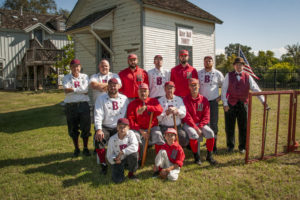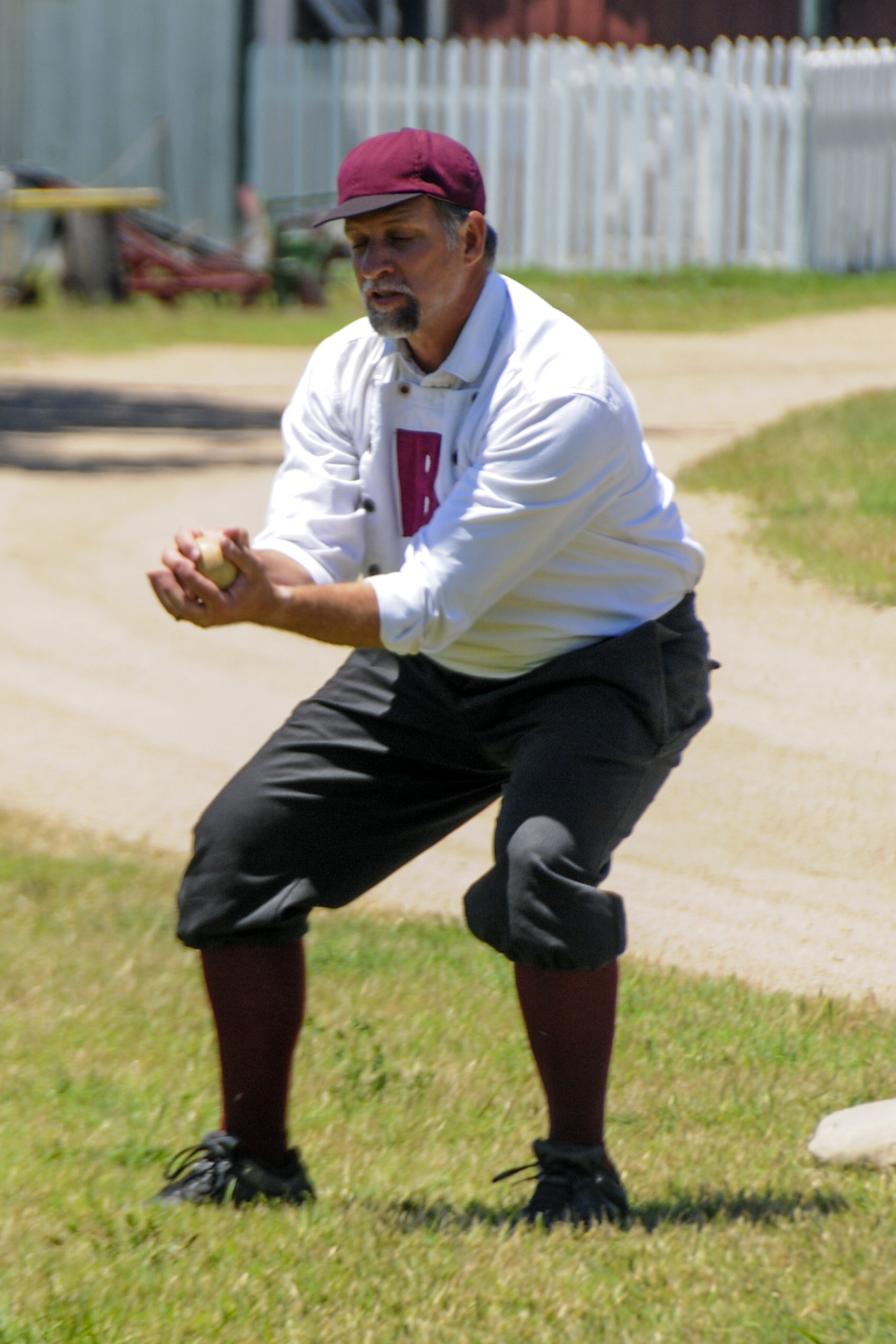By Bob Rives
When Major League Baseball staged a game in the Iowa cornfield where “Field of Dreams” was filmed, it became one of the most-talked-about regular season contests in decades.
Something similar plays out in Wichita when the city’s two vintage baseball teams square off at Old Cowtown Museum. Baseball is now rivaled in popularity by several other sports, but none invoke nostalgia like the original “America’s game.”
Wichita has two vintage teams that keep the game alive as it was played in its early days. Their names — the Bull Dozers and Red Stockings — belonged to real teams in 1879 that were among the first to represent Wichita.
“The Bull Dozers may have played only one game,” Cowtown volunteer and baseball fan Gary Lee said. “Then they became the Red Stockings.” The Dozers’ name did not come from big earth moving machines. “It was apparently meant to intimidate,” Lee says. “A bull dozer in the 19th century was someone who tried to run over you,” added Steve Sheahan, who played until his knees gave out and now keeps score.

Photos courtesy of Old Cowtown Museum
The Bull Dozers and Red Stockings are Wichita’s two vintage baseball teams. Opposite page, players are not allowed to use gloves.
Vintage vs. modern
The modern versions date to 2004 when Lee and friends Vance Davis and Paul Klinkhammer organized them to play at Wichita’s living history museum. Since then, some 200 players have been on one roster or the other. Most are fans of the sport and local history.
The game at Cowtown is similar to modern baseball but with differences:
• Players do not wear gloves. The exception are catchers — called behinds — who sometimes wore thin gloves.
• There are no called strikes. Only swinging and missing counts as a strike.
• All pitching is underhanded, and there is no windup. In spite of this limit, some pitchers can throw as hard as a fast-pitch softballer and even manage curves.
• The distance between pitcher and batter is 45 feet, not 60 feet, 6 inches as it is now.
• There is no pitching mound.
• Catching a hit ball after one bounce counts as an out as does catching it on the fly.
• The ball is bigger and softer than a modern baseball but not as big as a modern softball.
• No base stealing and no sliding.
‘Cranks’
Differences extend to the stands as well. In the 1870s, spectators at baseball games were called “cranks.” The term “fan” came along later. So the players at Cowtown are cheered by cranks.
Players of all ages suit up. Some are still in school. Lee, Klinkhammer and Davis are in their 50s. Others, such as Don Alvord, a former district court judge who now lives in Halstead, are playing in their 60s.
Several women and girls have played. The Cowtown contests even helped spark one romance. The woman at second base married the man who played shortstop.
All players on the teams have nicknames, as was the case when the sport first was played here. Davis is Bull. Clinkhammer is Colonel. Lee is Dixie, not for the South but for Dixie Lee, the infamous real-life madam for whom Cowtown’s can-can dancers are named. Is Gary related to Ms. Lee? “I don’t know,” he joked. “I need to check into that.”
The nicknames usually come from the other players. Sheahan is called Fingers because, as Lee said, “Steve was not a gold glove fielder.” Alvord’s nickname, Chilly, stems from the time another player poured a bucket of ice water over his head during a hot summer game.
Road games
In addition to Cowtown, the teams play at historic sites such as Fort Larned, the Eisenhower Center in Abilene and the Tinker Museum in Muscotah, Kan., hometown of Joe Tinker, who is in the National Baseball Hall of Fame in Cooperstown, N.Y. They once played the El Dorado Broncos, a semipro team that often contends for the championship in National Baseball Congress tournaments. The NBC and its president, Kevin Jenks, are supporters of the vintage teams, Lee said.
They’ve played in Texas, Missouri, Nebraska and in a large tournament in Columbus, Ohio, where they were unbeaten. But the best travel site was at the aforementioned Field of Dreams in Iowa. “We walked in through the corn just as they did in the film,” Lee said.
Vintage baseball is most popular back east. At the moment, only Emporia and Topeka have similar clubs in Kansas.
‘A gentleman’s game’
Sheahan points out that the clubs are careful to protect players through measures like the no-sliding rule. Games are usually scheduled for nine innings but are cut to seven if the day is too hot. “Very early, we often played a double header of two seven-inning games, but that become too much for some of the players,” Lee said. “So we now typically play one nine-inning game every two weeks unless we’re in a tournament.”
The teams also try to protect expensive equipment. The specially made baseballs are recovered if fouled out of the park — even if they go over the backstop and into the Arkansas River. Uniforms — based on original 19th century designs — are also pricey. The Cowtown teams have four sets. If someone comes to a game wanting to play, the team will get one from a storage building near home plate. They also take uniforms when going to other towns in case the locals don’t have them.
The games attract a following. Their covered grandstand along the first base line holds a hundred or more cranks. Chief among them is Francene Sharp, known for her cow bell. She comes by her role naturally. Her mom, Ernestine Davis, was well known to Wichita baseball followers from years of cheering — and ringing — on the city’s minor league and semipro teams. “She was a lifelong baseball fan who saw her first games on Ackerman Island,” Francene says of her mother. Now Francene brings the same excitement to Cowtown.
In one other change from modern baseball, there’s often no umpire for cranks to heckle since the games are regularly played on the honor system.
“We play a gentleman’s game,” Sheahan said.
Bob Rives wrote the book on baseball in Wichita — “Baseball in Wichita,” published by the History Press in 2004. He can be reached at bprives@gmail.com.









